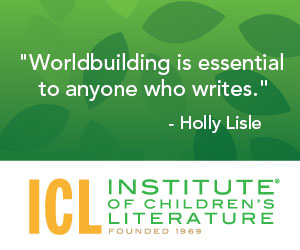1000 N. West Street #1200, Wilmington, DE 19801
© 2024 Direct Learning Systems, Inc. All rights reserved.
Beginning Tuesday, July 22, 2025 at 10 PM CT through Wednesday, July 23, 2025 at 4 AM CT, we will be performing scheduled maintenance to update our website.

Worldbuilding isn’t just for fantasy writers.

All the decisions you make about the world of your story or novel will fall under the heading of worldbuilding, and it is important to keep those decisions straight so your character doesn’t head upstairs to his bedroom in chapter one and then later describe his home as squat and narrow like a shot gun in chapter five.
The decisions you make will help the story feel real, but they must be made carefully, or they can just as easily throw the reader out of the story.
The first thing to keep in mind as you write within this newly created world, is that you don’t need to present all your worldbuilding to your reader in the opening. Long information dumps about the world will bore readers and remind them that there are other things they could be doing. We never want that to happen. In real life, we experience the world as we move through it and interact with it. That is the best way for your readers to experience it as well: through the characters and their actions, observations and reactions.

Keep in mind that we rarely notice the things that are around us all the time. You may have a ceramic kitty on your windowsill but if it’s been there for years, you’re only going to notice it if you have a really good reason to notice it. For instance, if I need my character to look at that kitty, it may be because she sees a ladybug crawling on the kitty’s ear so she puts out a finger for the ladybug to crawl onto and takes the bug outside, and in doing so, she might think something about the kitty figurine.
If you don’t need it, don’t include it. You might be one of the writers who just loves making maps, so you’ve made an extensive map of the character’s neighborhood, noting where everyone lives and where the park is located and where shops are. That’s great, but those items should only creep into the story if they serve the story. Some of us really like to do a lot of thinking about the world our characters inhabit, but not everything we might imagine is going to work on the page. This may mean you will know things about the world that you never share with the reader. That’s okay, actually. Don’t force it (and it if helps, you could always imagine those unexplored bits are being saved for the sequel after the book becomes wildly popular).
Understand that worldbuilding is part of every stage of the writing: first during prewriting when you’re imagining your characters and the world they inhabit, again when you’re writing and you move the characters through that world, and still more during revision, when you consider every bit of the Worldbuilding and ask yourself how to make it better, more sensory, more engaging, and more natural.
Worldbuilding is fun and when handled well, it’s fun for the reader as well.
With over 100 books in publication, Jan Fields writes both chapter books for children and mystery novels for adults. She’s also known for a variety of experiences teaching writing, from one session SCBWI events to lengthier Highlights Foundation workshops to these blog posts for the Institute of Children’s Literature. As a former ICL instructor, Jan enjoys equipping writers for success in whatever way she can.
1000 N. West Street #1200, Wilmington, DE 19801
© 2024 Direct Learning Systems, Inc. All rights reserved.
1000 N. West Street #1200, Wilmington, DE 19801
© 2024 Direct Learning Systems, Inc. All rights reserved.
1000 N. West Street #1200, Wilmington, DE 19801
© 2024 Direct Learning Systems, Inc. All rights reserved.
1000 N. West Street #1200, Wilmington, DE 19801
© 2025 Direct Learning Systems, Inc. All rights reserved.
1000 N. West Street #1200, Wilmington, DE 19801
©2025 Direct Learning Systems, Inc. All rights reserved. Privacy Policy.
4 Comments